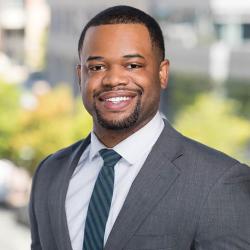The Management Consultant and Musician
Fall
2018
Spotlight on Hidden Physicists
The Management Consultant and Musician
Nick Sneed, Sigma Pi Sigma, Howard University, 2013
By:Nick Sneed as told to Kendra Redmond, Contributing Editor
 I’m used to surprising people. A physicist by education, musician by night, and management consultant by day, some people struggle to see the threads holding my interests together. But for me, it’s simple: creativity and problem-solving.
I’m used to surprising people. A physicist by education, musician by night, and management consultant by day, some people struggle to see the threads holding my interests together. But for me, it’s simple: creativity and problem-solving.
At age eight I arranged my bedroom into a recording studio. Today, I produce, manage, and release my own music. Music is a benefactor of all of the other experiences that I’ve had, like earning a physics bachelor’s degree at Howard University, working as a patent examiner, and becoming a consultant.
I didn’t start out with this career path in mind. In my last year of college, everyone—my parents to professors—were on me about making a plan. I could almost hear my department chair sigh, “Here comes Nick again, let’s try to get him to do something besides that music…” I eventually settled on the idea of medical school and got a job working part time for the Society of Physics Students while studying for the MCAT.
At SPS, I helped assemble the Careers Toolbox (http://www.spsnational.org/sites/all/careerstoolbox/), a resource for undergraduate physics students interested in entering the workforce after graduation. As part of this project, I saw a list of common job titles held by physics bachelor’s degree recipients. The list included things like analyst and patent examiner and, for the first time, I realized it might be possible to get a career-track job without an advanced degree.
Inspired, I applied for a job as a patent examiner and was hired by the US Patent and Trademark Office to examine digital signal processing patent applications. “What the heck is digital signal processing?” I wondered, worried I was in over my head. My first patent, for a pair of headphones, put me at ease. My physics and music experience helped me learn quickly, and I was able to focus on understanding the legal side of the job rather than being distracted by the technical side.
A few years into life as a patent examiner, I met a recruiter from a major consulting firm. At the time I didn’t know much about consulting firms, much less that one might be interested in hiring me. To my surprise, when I told her I was a physics major, she looked at me like I had a golden ticket. I interviewed and was hired.
As a consultant, I work with government agencies to creatively solve business-related problems. My goal is to help agencies improve the employee experience. I help unite a workforce along a mission or vision or purpose, in order to increase retention. Consulting requires creative problem-solving, just like physics. Instead of solving the Schrödinger equation, I tackle problems like how to provide job training in formats that engage diverse employees.
One of my personal goals is to let physics students know what I didn’t—that physics graduates aren’t limited to jobs that require an advanced degree. Have an open mind. Physicists are not only smart, we are trained at solving an array of problems that exist in the natural world. And problem-solvers are what the world runs on.

